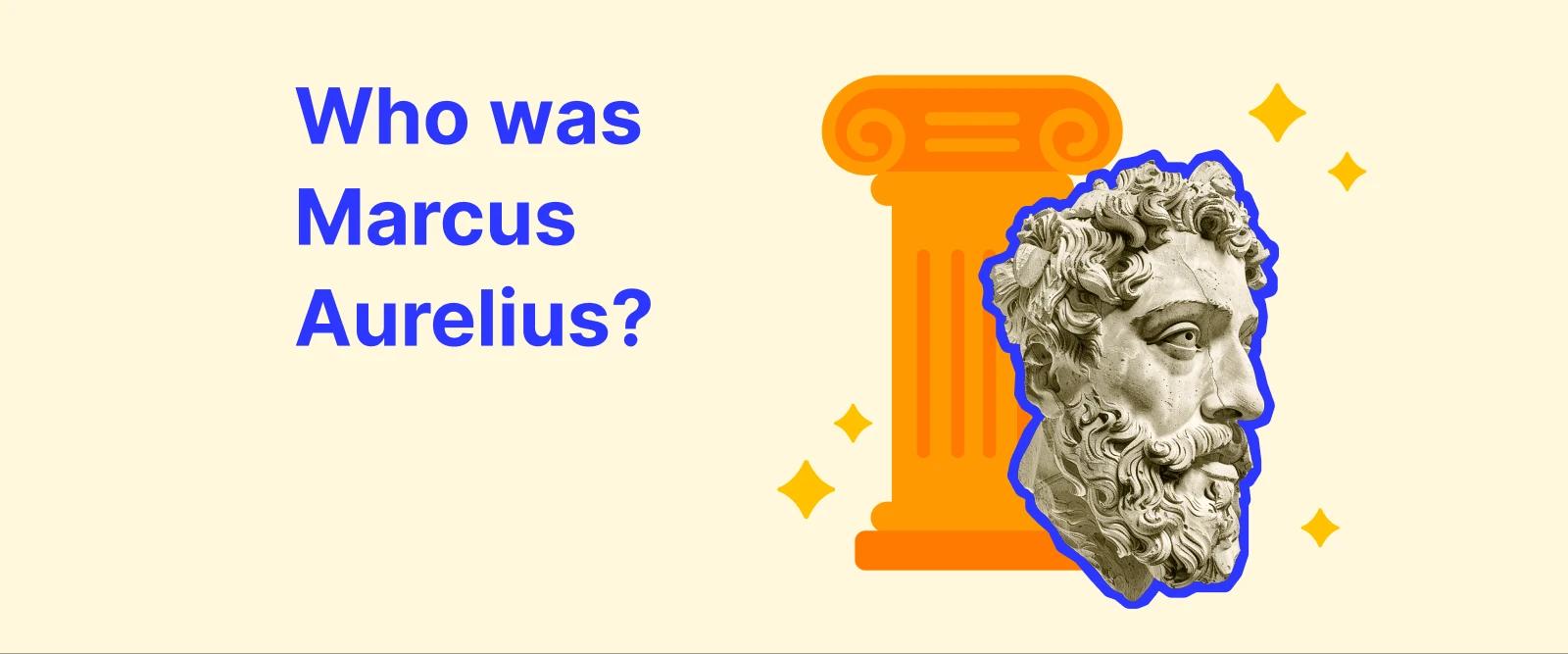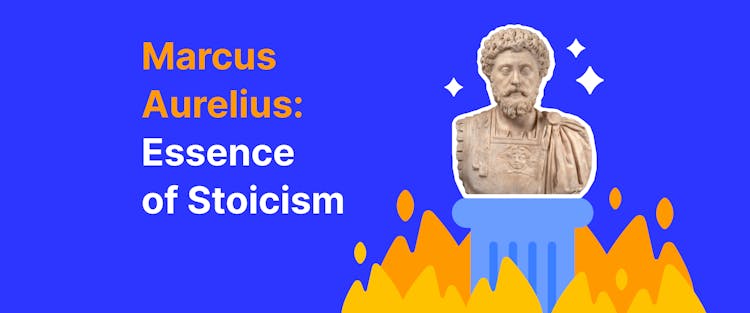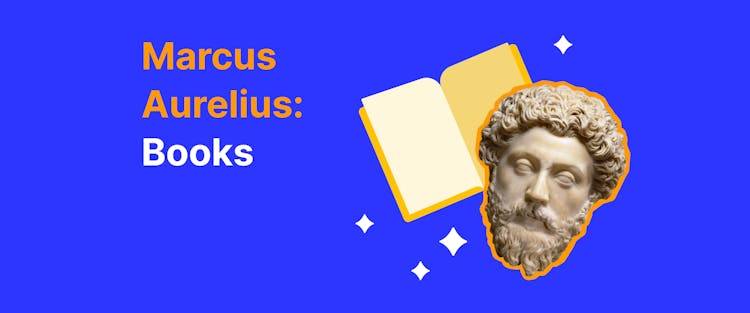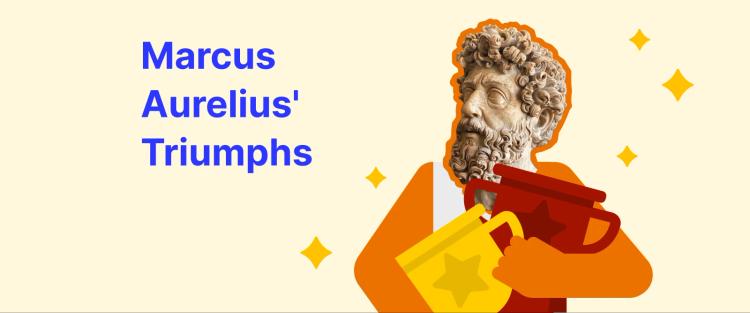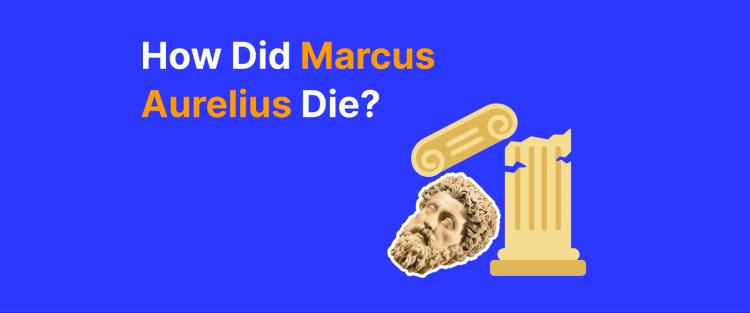Who was Marcus Aurelius, and why does his wisdom still inspire modern leaders? Marcus Aurelius Antoninus was the last of the glorious galaxy of five good emperors of Ancient Rome — Nerva, Trajan, Hadrian, and Antoninus Pius. From his first steps in philosophy to Stoicism and leadership, learn more about Marcus Aurelius' life and teachings.
For a more detailed account on Aurelius' philosophy and wisdom, browse through the summary of 'Meditations' in Headway's online library. This ancient text has remained relevant through ages, offering a collection of Marcus Aurelius' life-lessons and their practical application to modern leadership.
Marcus Aurelius' life timeline: Key moments and achievements
121 CE – Born in Spain, into an aristocratic family of patrician origin.
138 CE – Adopted by Emperor Antoninus Pius, becoming his successor.
161 CE – Became emperor at age 40 alongside co-emperor Lucius Verus.
169 CE – Became sole ruler after Lucius Verus’ death.
170s CE – Fought the Marcomannic Wars, defending the empire’s borders.
174-179 CE – Wrote 'Meditations' during his military campaigns while dealing with personal and military challenges.
177 CE – Appointed his son, Commodus, as co-emperor.
180 CE – Died of natural causes, marking the end of the "Five Good Emperors."
Marcus Aurelius' early life and path to power
Marcus Aurelius was born in Spain in 121 CE in an aristocratic family of patrician origin. His paternal and maternal ancestors belonged to the senatorial class. The father of the future emperor was Marcus Annius Verus (III), who died while serving as praetor.
His mother, Domitia Lucilla, was the daughter of the Roman patrician. His grandfather, Marcus Annius Ver, was twice consul and prefect of Rome.
Having learned the Greek language as a child, Aurelius actively improved his oratorical skills. Philosophy was a subject of his particular interest.
Herodes Atticus and Marcus Fronto were tutors in Latin and Greek for Marcus. He was attracted to the teachings of the Cynics, their denial of social differences, and simplicity in everyday life, which Aurelius mentions in his work 'Meditations.'
How Roman religion shaped Marcus Aurelius' leadership
Marcus Aurelius was raised with great respect for traditional Roman religion. Already at the age of seven, he was enrolled in the collegium of priests.
Marcus Aurelius was cautious about fulfilling his duties. Marcus Aurelius' sincere religiosity had been essential to the Roman Empire since he became the emperor.
All his actions, his policy toward religious cults and especially Christians, were determined by the fact that he sincerely believed in the Roman gods and was firmly convinced of the necessity of proper upbringing of all religious rites.
A big fan of philosophy, he sympathized with philosophers who interpreted Christians negatively.

The influence of Antoninus Pius: Aurelius' adoptive father
After the death of his adoptive son Aelius Caesar, Emperor Hadrian wanted to see Marcus as emperor in the future, so he offered Aurelius Antoninus (the future emperor Antoninus Pius) to adopt Marcus and Lucius Verus and, in the coming, transfer the imperial power to them.
Intuition and insight allowed Hadrian to recognize the future great ruler of Rome in the boy. Antoninus Pius was a great emperor and a role model for the young Marcus, as he later wrote in his writings.
From Antoninus Pius, the young man learned political art, morality, and the ability to resolve conflicts and contradictions wisely. In turn, Antoninus fully trusted his adopted son, which made him a co-ruler and allowed him to share all the responsibilities of power.
Their relationship was imbued with deep mutual understanding. Antoninus married Marcus to his daughter, Faustina the Younger, and trained and instructed him extensively in the art of government.
What led Marcus Aurelius to Stoicism?
At this time, Marcus Aurelius was under the influence of the outstanding Stoic philosophers and thinkers such as Apollonius of Chalcedon, Cato, Seneca, Cicero, and Quintus Junius Rusticus.
Junius Rusticus was well-versed in Stoicism and competent in domestic policy and the military sphere. Marcus Aurelius spent his youth in the imperial palace on Palatine Hill. Famous philosophers like Fronto, Apollonius, and Junius Rusticus taught him.
One day, one of them presented Marcus with 'Conversations' by Epictetus. This book and the lessons of the teachers would make him a Stoic. As Aurelius admitted in his 'Meditations,' he borrowed a lot from them, which helped him effectively manage the empire.
How did Marcus Aurelius and Lucius Verus co-rule Rome?
The reign of Antoninus Pius was a unique period in Rome's history. No one violated the vast empire's outer borders, and peace and harmony reigned within its borders.
Marcus Aurelius became the Roman emperor in 161 at the age of 40. After the death of Antoninus Pius, their adoptive father, in early 161, Marcus Aurelius Antoninus Augustus and Lucius Ceionius Commodus Verus ascended the throne as co-emperors.
At first, the emperors' actions to boost the economy, fight poverty, and strengthen the army brought success and were welcomed by the empire's population.
However, in the future, the difference in worldview between the Stoic views of Aurelius and the exceptional extravagance of his adoptive brother, Lucius Ver, led to unpleasant consequences.
Believing that Rome was weakened, the Parthian king Vologes attacked the Roman province of Syria and its ally Armenia. The war lasted five long years and ended with Rome's victory thanks to the art of Roman generals and the quality management of the empire by Marcus Aurelius, who was in Rome during the war.
The results of the war were favorable to Rome, and the Parthians made no more attempts to attack Roman possessions during Aurelius' lifetime.
Key philosophical beliefs that guided Marcus Aurelius' reign
Stoic philosophers believed that it did not matter what business a man chose. He needed to learn to show nobility, be responsible, and follow duty and honor in everything he did.
Stoics considered these qualities to be the core of human morality. Teach not by words but by example, they said. Marcus Aurelius remembered this principle all his life.
Building the ideal state
Marcus Aurelius sought to create a kingdom of philosophers, the ideal state that Plato dreamed of. The emperor's former teachers and mentors — Atticus, Fronto, Junius Rusticus, and Claudius Severus — became Roman consuls and held important positions in the state.
Even under Hadrian, the principles of Stoic philosophy were elevated, and ideas of equality between people began to penetrate the strict Roman legislation, turning it towards man. The purpose of Marcus Aurelius' laws and decrees was the welfare of the ordinary people in the empire.
Civil law, the principles of the sovereign's responsibility before the law, the state's concern for citizens, the character of police, and the registration of newborns all trace their origins to Marcus Aurelius.
He ordered the collection of hefty taxes from the rich and, with these funds, opened asylums for orphans and the poor and founded colleges where young Romans could study philosophy. This philosopher embodied a moderate policy.
The power of humane leadership
His rule reflected respect for the people, the Senate, and its members. The time of imperator Aurelius' reign was called the "Senate Renaissance" because he emphasized his obedience to the Senate, the supreme imperial power at that time.
In this historical period, approaches to slavery and violence against slaves changed, and their murder was recognized as a crime thanks to the emperor. Thus, Roman emperor Marcus Aurelius tried to transfer the Stoics' teachings to the Roman state's practical realities.
Marcus Aurelius pointed to moral maxims that he sought to follow himself and advised others to follow. His humane attitude towards man and the main ideas of his philosophical thought became a remarkable legacy and heritage of the history of Ancient Rome.
“If you do the job in a principled way, with diligence, energy, and patience, if you keep yourself free of distractions, and keep the spirit inside you undamaged, as if you might have to give it back at any moment— If you can embrace this without fear or expectation—can find fulfillment in what you're doing now, as Nature intended, and in superhuman truthfulness (every word, every utterance)—then your life will be happy.” (Hays translation)

Aurelius' reign: Major achievements and governance style
Marcus Aurelius was not just a good administrator; he was a Stoic philosopher who ascended the throne and a concentration of the purest philanthropic philosophy.
Why Marcus Aurelius was considered a philosopher king
In the person of Marcus Aurelius, two types of people were combined: a merciful philosopher and a superstitious pagan. Paganism, as a religious cult, was very essential for the emperor.
Christianity became not just one of the religions of the Roman Empire but also a religion that overthrew the paganism that Augustus loved. Marcus Aurelius issued decrees on the persecution of Christians.
War, plague, and other issues
Wars and internal upheavals affected imperial finances. During the wars on the Danube, extraordinary measures were necessary: items belonging to the emperor, precious dishes, precious stones, and imperial clothing were sold at auctions.
The economic situation of the empire during Marcus Aurelius' reign was shaken. In the first year of his reign, the emperor sent six Roman legions to a division with his co-ruler Lucius Verus and the best army generals to quell the rebellion in Armenia.
Five years later, the Roman soldiers returned to their homeland victorious. But a plague would follow them from the East. The epidemic quickly spread throughout the empire and raged in Rome. The disease would take hundreds, thousands of human lives. In 166 — a new war began.
Marcomanni and Quadi filled the Roman provinces in the north. They were leading the entire barbarian world — dozens of tribes. The Roman history had never known such a situation. They armed even slaves and gladiators.
Military campaigns
Marcus Aurelius went down in history as a great general. He felt a deep aversion to war and was always far from striving for military honors and glory, but he treated the matter of protecting the state with all attention.
One of the most peaceful emperors in the entire history of Rome, he spent 14 of his 18-year reign in military campaigns, protecting the borders of the empire and the peace of its citizens.
He campaigned patiently, endlessly, and successfully against the Germanic tribes Quadi and Marcomanni that crossed the Danube River and invaded the Roman province of Pannonia, prompting Marcus Aurelius to take action.
This tactic was calculated based on the Roman soldier's endurance, tenacity, and the forces' economy.
The paradoxes of power: The emperor's challenges in leadership
Marcus Aurelius did not chase brilliant victories and avoided all useless cruelty and treachery toward his enemies. The army loved and respected the emperor, and fate prepared new tests for him. Still, he often came across corruption and betrayal within his own empire.
How did Avidius Cassius' rebellion test Aurelius' authority?
General Avidius Cassius, an intelligent, educated man who once loved Marcus Aurelius, raised a rebellion in Syria. Cassius received broad support in the eastern provinces: Egypt, Syria, and Arabia Petraea.
Cassius controlled Egypt's vital grain production. Cassius wanted to win the favor of Aurelius' soldiers and provincials, so he decided to use his cunning and announce the emperor's death.
After learning about Cassius' betrayal, Marcus Aurelius remained calm, not succumbing to feelings of anger and revenge for a moment. The mutiny lasted three months and six days. Avidius Cassius was killed by one of his accomplices.
Marcus Aurelius gave a full amnesty to his supporters. Marcus Aurelius' reaction to the most diverse situations in life never diverged from his philosophical beliefs, and the emperor's actions in no way contradicted his highest ideas.

Why did Marcus Aurelius hope for a better successor?
The son of Emperor Commodus is the complete opposite of his father. Later, with his rule, Commodus will write one of the darkest pages in the history of Rome.
With bitterness, Marcus Aurelius realizes that after his death, the administration of the state will pass on to a man more like the son of a gladiator than the emperor of Rome.
Having a naive hope for education, Marcus Aurelius surrounds his son Commodus with teachers of philosophy and morality —without effect.
The heir seeks only the society of mimes, circus riders, and gladiators, whom he surpasses in rudeness and strength. Amid betrayals, the Stoic emperor maintains his nobility.
He sincerely believes that sincere kindness is invincible. Commodus was the last representative of the Antonine dynasty, which ruled the Roman Empire for almost 100 years.
Marcus Aurelius' legacy: How his philosophy endures
Marcus Aurelius' sole rule lasted until 177 when his 16-year-old son Lucius Aurelius Commodus became co-ruler. Well-educated, Marcus Aurelius gained fame as a philosopher during his lifetime, leaving behind a 'Meditations' written in Greek and a moderate ruler.
His death in 180 (Vienna) is considered the end of the two-hundred-year period known as the "Peace of Rome," followed by a time of instability and wars that led to the gradual decline of the Roman Empire.
The timeless wisdom of Marcus Aurelius' 'Meditations'
Marcus Aurelius wrote his thoughts on life in the 70s of the second century, having already had the opportunity to summarize his own life and the development of Rome's empire under his leadership.
What is a philosophy? It is not intellectual knowledge, not the construction of theoretical systems, but a method of inner work and transformation of a human being, a set of philosophical exercises designed to change a life.
Pierre Hadot, in his book ‘The Inner Citadel: The Meditations of Marcus Aurelius,’ talks about writing a philosophical work, conducting an intellectual dialogue, reflecting on concepts, and self-reflection as an awareness of the value of the present moment. All these are different facets of philosophy as a way of life.
Learn Marcus Aurelius' leadership philosophy with Headway
Stoic philosophy guided Marcus Aurelius' choices and way of life. Now, you can also discover its key premises by reading or listening to the summary of 'Meditations' on the Headway app.
This microlearning tool offers you a wide range of nonfiction bestsellers on leadership, strategic thinking, and decision-making, all in short, bite-sized format for easier comprehension.
Download the Headway app today and start your self-growth journey with world's
Frequently Asked Questions
What is Marcus Aurelius known for?
Marcus Aurelius is best known for being a Roman emperor and a Stoic philosopher. He is widely celebrated for his philosophical writings, particularly ‘Meditations,’ which offers timeless wisdom on personal ethics, leadership, and resilience.
His reign is often considered a high point in Roman history, characterized by his efforts to defend the empire and his deep commitment to Stoic principles.
When was Marcus Aurelius emperor?
At 40, Marcus Aurelius became the sixteenth emperor of the Roman Empire. He was a Roman emperor from 161 to 180. He ascended the throne in 161 and ruled with his brother Lucius Verus until 169. Marcus Aurelius became the Roman Empire's sole ruler after Lucius Verus' death.
Who ruled after Marcus Aurelius?
Commodus reigned as emperor following Marcus Aurelius from 180 to 192. He was the last representative of the Antonine dynasty, named after his father's co-ruler, Lucius Verus Commodus. He made peace with the barbarians and gave up new territorial possessions.
Was Marcus Aurelius assassinated?
No, Marcus Aurelius was not assassinated. He died peacefully of natural causes in 180 CE, at the age of 58, after a long reign as emperor. His death marked the end of the "Five Good Emperors" and the beginning of a turbulent period in Roman history.
Despite facing numerous military and political challenges during his reign, Marcus Aurelius passed away while still in power, leaving behind a legacy of thoughtful leadership and philosophical reflection.
How was the reign of Marcus Aurelius different from that of most emperors?
Marcus Aurelius was a knowledgeable and cultured person who found the most pleasure in philosophy above all other pursuits. He faced one of the most challenging tasks of any Emperor since Augustus established the Empire two centuries before Marcus ascended to the throne.
He achieved victory in the Marcomannic Wars. Marcus battled against a catastrophe that struck the ancient world—a plague that potentially claimed the lives of up to a third of the population.
What Marcus Aurelius book should I read?
The most widely recommended book by Marcus Aurelius is ‘Meditations.’ This is his personal journal, written in Greek during his military campaigns, where he reflects on Stoic philosophy and shares his thoughts on how to live a virtuous life.
The first recorded mention of the book is by Themistius in C.E. 364. Today, there're multiple editions with modern translation of ‘Meditations’ from respected publishers like Cambridge University Press and Oxford University Press.

